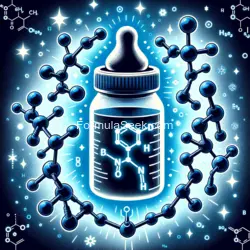
Understanding Pyridoxine Hydrochloride and Its Role in Infant Formula
When it comes to the health and nutrition of infants, every ingredient in their diet matters. One ingredient often appearing in infant formula is Pyridoxine Hydrochloride, commonly known as Vitamin B6. This essential nutrient plays a vital role in infants' overall development and well-being. In this blog post, we'll explore what Pyridoxine Hydrochloride is, its benefits, and why it's added to infant formula.
What is Pyridoxine Hydrochloride?
Pyridoxine Hydrochloride is one form of Vitamin B6, a water-soluble vitamin crucial for various physiological functions. It's found naturally in many foods but can be used synthetically in supplements and fortified foods like infant formula. The body needs Vitamin B6 for more than 100 enzyme reactions involved in metabolism, making it indispensable for energy production, brain development, and immune function.
The Importance of Vitamin B6 for Infants
Infants have high nutritional needs to support their rapid growth and development. Here's why Vitamin B6 is so crucial for them:
- Brain Development: Vitamin B6 is essential for creating neurotransmitters, which are chemicals that transmit signals in the brain. These neurotransmitters are vital for developing cognitive skills and emotional health.
- Immune Function: Adequate B6 levels help maintain a healthy immune system, which is crucial for infants who are still building their resistance to infections.
- Metabolism: B6 assists in metabolizing proteins, fats, and carbohydrates, providing the energy infants need to grow and thrive.
- Hemoglobin Production: It's also involved in making hemoglobin, the protein in red blood cells that carries oxygen throughout the body.
Why Add Pyridoxine Hydrochloride to Infant Formula?
Breast milk naturally contains Vitamin B6, but when breastfeeding isn't possible, infant formula needs to replicate its nutritional profile as closely as possible to ensure that babies receive all the necessary nutrients. Here's why Pyridoxine Hydrochloride is added:
- Consistency and Stability: Pyridoxine Hydrochloride is a stable form of Vitamin B6 that can withstand the processing and storage of infant formula without losing its nutritional value.
- Absorption: It's easily absorbed by the body, ensuring infants receive the full benefits of Vitamin B6.
- Regulatory Compliance: Many countries have regulations requiring that infant formula contains certain levels of essential nutrients, including Vitamin B6, to ensure that all infants get the nutrition they need.
Safety and Recommendations
Pyridoxine Hydrochloride is generally safe and well-tolerated in the recommended amounts. However, it's always important for parents to discuss any concerns about their infant's diet with a healthcare provider. The amount of Vitamin B6 needed can vary based on an infant's age, weight, and health status, and a healthcare provider can offer personalized advice.
Conclusion
In conclusion, Pyridoxine Hydrochloride is crucial in ensuring that infant formula is a complete and balanced source of nutrition for babies who are not breastfed. Vitamin B6 helps lay a strong foundation for a child's health and development by supporting brain development, immune function, metabolism, and oxygen transport. As with all aspects of infant nutrition, parents must be informed and consult with healthcare providers to make the best choices for their child's needs.



